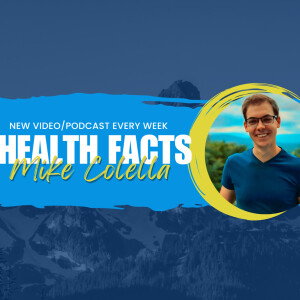

Episode List

RED-S
In this episode, we dive deep into Relative Energy Deficiency in Sport (RED-S)—a condition that affects athletes of all levels when energy intake doesn’t meet the demands of training and daily life. We explore the science behind RED-S, how it impacts performance, health, and recovery, and why it’s more than just a “female athlete” issue.From hormonal disruptions and bone health to mental fatigue and increased injury risk, RED-S is a critical topic for coaches, athletes, and anyone involved in sports performance and wellness. Join us as we unpack the warning signs, long-term consequences, and most importantly—how to prevent and manage RED-S through proper fueling and education.Whether you’re an athlete, health professional, or fitness enthusiast, this episode will give you the knowledge to spot RED-S and support a balanced, sustainable approach to training and nutrition.

Five hyped-up supplements - are they really worth it?
Are supplements science-backed solutions or overhyped distractions? In this episode of Health Facts, we break down the five most talked-about supplements of 2025—including creatine, nootropics, NAD+ boosters, greens powders, and collagen.Using the latest research from the last 10 years, we explore: • What actually works and what doesn’t • Safety concerns and regulatory status • Real-world results vs. influencer promises • What to look for before you buyWhether you’re chasing better workouts, cognitive edge, or long-term health, this episode helps you separate the science from the nonsense—so you can make smart, informed choices.Show Notes / ReferencesCreatine Monohydrate • Kreider RB, et al. (2017). International Society of Sports Nutrition position stand: safety and efficacy of creatine supplementation in exercise, sport, and medicine. JISSN. https://doi.org/10.1186/s12970-017-0173-z • Candow DG, et al. (2019). Low-dose creatine supplementation improves strength and body composition in aging adults. Nutrients. https://doi.org/10.3390/nu11010094 • Avgerinos KI, et al. (2018). Effects of creatine supplementation on cognitive function in healthy individuals. Exp Gerontol. https://doi.org/10.1016/j.exger.2018.04.018Nootropic Stacks (L-Theanine, Alpha-GPC, Lion’s Mane) • Camfield DA, et al. (2014). The effects of L-theanine and caffeine on cognitive performance and mood. Nutr Neurosci. https://doi.org/10.1179/1476830513Y.0000000079 • Ziegenfuss TN, et al. (2008). Effects of an Alpha-GPC supplement on physical and psychomotor performance. JISSN. https://doi.org/10.1186/1550-2783-5-4 • Saitsu Y, et al. (2019). Hericium erinaceus (Lion’s Mane) improves cognitive function in adults. J Tradit Complement Med. https://doi.org/10.1016/j.jtcme.2019.02.004NAD+ Boosters (NMN, NR) • Yoshino M, et al. (2018). NAD+ intermediates: the biology and therapeutic potential. Cell Metab. https://doi.org/10.1016/j.cmet.2018.05.019 • Elhassan YS, et al. (2019). Nicotinamide riboside augments muscle remodeling in older adults. Cell Rep. https://doi.org/10.1016/j.celrep.2019.02.015 • Dollerup OL, et al. (2020). Clinical effects of NR supplementation: A double-blind randomized trial. JCEM. https://doi.org/10.1210/clinem/dgz289 • Liao B, et al. (2021). Lack of significant effect of NR on metabolism in healthy adults. Front Physiol. https://doi.org/10.3389/fphys.2021.667988Greens Powders • Cohen PA, et al. (2022). Unregulated supplements and misleading health claims: A case study of greens powders. JAMA Netw Open. https://doi.org/10.1001/jamanetworkopen.2022.1098 • Note: No peer-reviewed studies exist for most branded greens blends—only studies on isolated ingredients (e.g., spirulina, chlorella, probiotics).Collagen Peptides • Clark KL, et al. (2008). Collagen hydrolysate improves joint health in athletes with activity-related joint pain. Curr Med Res Opin. https://doi.org/10.1185/030079908X291967 • Zdzieblik D, et al. (2017). Collagen supplementation and skin elasticity. J Med Food. https://doi.org/10.1089/jmf.2016.3884 • Shaw G, et al. (2017). Oral collagen combined with resistance training improves tendon properties. Am J Clin Nutr. https://doi.org/10.3945/ajcn.116.136762

Adopting a Healthier Lifestyle Part 2
Adopting a healthier lifestyle involves making informed and personalized choices that cater to your unique needs. It starts with understanding and refining your nutrition preferences, ensuring your diet aligns with both your tastes and health goals. Emphasizing a balanced intake of macronutrients—carbohydrates, proteins, and fats—along with essential micro minerals such as iron, calcium, and zinc, is crucial for overall well-being. To personalize your approach, consider specifics for your needs. This might include adjusting your diet based on age, activity level, or any health conditions you might have. For instance, athletes may require more protein for muscle repair, while individuals with certain medical conditions might need to monitor their sodium intake. Staying well-versed in the latest nutritional literature is also important. Nutritional science is an ever-evolving field, with new research continually offering insights into the best practices for maintaining health. By keeping up with these developments, you can make evidence-based decisions about your diet and lifestyle. Incorporating regular physical activity, ensuring adequate hydration, and managing stress are additional components of a healthy lifestyle. Together with a nutrient-rich diet tailored to your personal needs, these practices form the foundation of a sustainable and healthy way of living. If you’ve enjoyed our podcast and want to support us in bringing you more high-quality, evidence-based health information, consider becoming a patron! Your support via Patreon helps us cover production costs and dedicate more time to creating content you love. Join our community today at Patreon. Alternatively, you can support us directly through Spotify! Just visit our Spotify page and explore the options to contribute. Your support means the world to us and helps keep the podcast going strong. Thank you for being a valued listener!

HOW to adopt a healthier lifestyle part 1
Welcome to Health Facts with your host, Mike Colella, Certified Health Coach. Today, we're diving into the transformative benefits of adopting a healthier lifestyle in our first segment. Whether you're just starting your wellness journey or looking to optimize your health, understanding the impact of lifestyle changes can be incredibly motivating. One of the primary benefits of a healthier lifestyle is the improvement of metabolic function. This encompasses a range of processes that convert food into energy, support cell growth, and maintain vital bodily functions. By eating a balanced diet and engaging in regular physical activity, you can boost your metabolism, making it easier to manage weight and reduce the risk of metabolic disorders. Better sleep is another significant advantage of living healthily. Regular exercise and a nutritious diet can enhance sleep quality, helping you to fall asleep faster and enjoy deeper, more restorative rest. Improved sleep not only increases daytime energy levels but also supports cognitive function and emotional well-being. For those concerned about bone health, a healthier lifestyle can lead to improved bone mineral density. Weight-bearing exercises such as walking, running, and resistance training are particularly effective in strengthening bones and preventing osteoporosis, ensuring your skeletal system remains robust as you age. Increased VO2 max is a key indicator of cardiovascular fitness and overall health. This measurement reflects your body's ability to consume and utilize oxygen during intense exercise. By incorporating aerobic activities like cycling, swimming, or high-intensity interval training (HIIT) into your routine, you can enhance your VO2 max, leading to greater endurance and stamina. Better insulin sensitivity is another critical benefit, especially for those at risk of type 2 diabetes. A healthy diet rich in whole foods, combined with regular physical activity, can help your body use insulin more effectively, maintaining stable blood sugar levels and reducing the risk of diabetes and its associated complications. By adopting these healthy habits, you not only improve your physical health but also boost your mental and emotional well-being, creating a balanced, fulfilling life. Remember, the journey to a healthier lifestyle is a marathon, not a sprint, and every small change you make can have a significant impact over time. Your support helps us bring you more valuable health insights and tips. Visit Support this Podcast to contribute. Until next time, stay healthy and keep thriving!

Bloating: Tips and Tricks to Minimize
In this episode, we'll explore the multifaceted nature of bloating: its causes, complications, and management strategies. Bloating can arise from digestive disorders, food intolerances, lifestyle factors, and stress, often leading to pain, digestive disruptions, and psychological stress. We'll discuss immediate relief methods, including over-the-counter remedies, herbal teas, and physical activities like walking and yoga. Long-term solutions involve dietary adjustments, such as identifying trigger foods, increasing fiber gradually, and incorporating probiotics. We'll also emphasize the importance of healthy eating habits, hydration, regular exercise, and stress management. For persistent or severe bloating, consulting a healthcare provider is crucial to rule out underlying conditions and receive personalized treatment. Have questions or topics you'd like us to cover? Email us at healthfacts207@gmail.com.
You may also like
Create Your Podcast In Minutes
- Full-featured podcast site
- Unlimited storage and bandwidth
- Comprehensive podcast stats
- Distribute to Apple Podcasts, Spotify, and more
- Make money with your podcast












